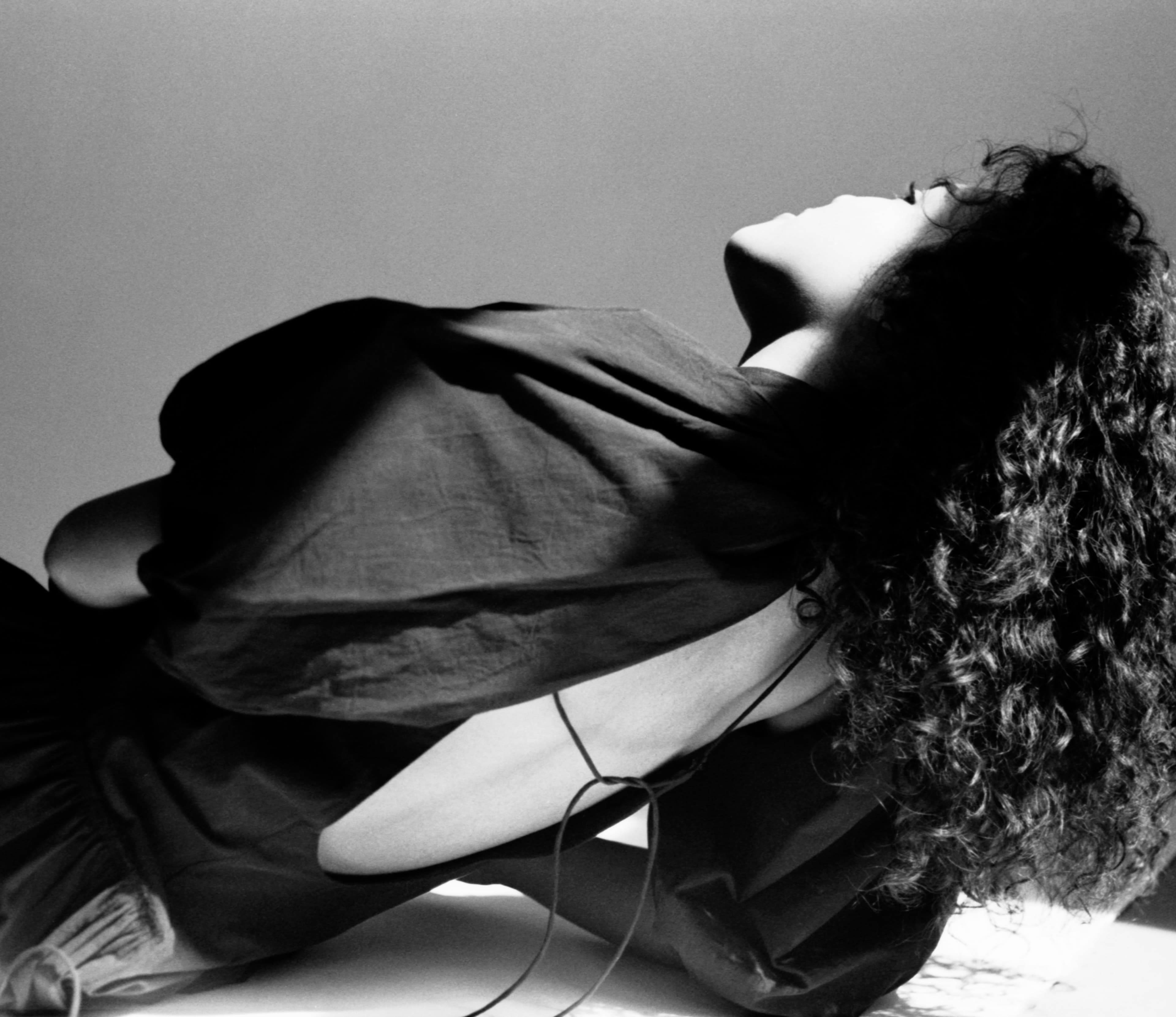
Dress by Ashlyn
Mia Isaac Is Ready to Be Seen
Few people are fortunate enough to know their calling at a very young age, but for Mia Isaac, it was clear. “I think I was five or six, and I asked for an agent on my Christmas list,“ laughs Isaac, now eighteen, as she recalls her early desire to pursue acting. It would take a few more years to convince her parents to go along with it, and they finally caved to her appeals around the time she was ten. “It was something I always knew I wanted to do and my parents were a little bit hesitant because they didn’t really know anything about the industry and they had heard horror stories,“ she reacalls. “So I made a deal with my dad and he said if I learned my times tables up to like fifteen or something, I could get an agent.“
After working locally in Atlanta for a few years, Isaac’s perseverance has led to a well-earned leap into Hollywood with the release of her first two feature films within only a couple of weeks—the heartwrenching Amazon dramedy Don’t Make Me Go with John Cho, which follows the father-daughter pair on a reluctant cross-country road trip, and Hulu’s Not Okay, a satirical cautionary tale about what is genuine in the social media age.
In Don’t Make Me Go, Isaac plays the individualistic teenager Wally, who gets dragged along on a bonding adventure by her single father, Max (Cho), after he receives news of a possibly terminal diagnosis. Wally and Max grow closer during the road trip as they each begin to understand one another as individuals rather than just fulfilling the role of father or daughter. Isaac says that she’s grateful to have worked with Cho and that they “clicked right away,“ making the on-screen chemistry effortless. “John really did feel like my dad when we were shooting and I remember the last day of shooting, we were sitting in the car and they called cut and he kind of just turned to me and he was like, ’Now we’re just friends,’“ says Isaac. “That’s really reflective of our relationship because it felt like he was my dad during those months, but after we wrapped and went our separate ways, we’ve come back and we’ve had coffee and lunch and met up when we’re in the same state or country. But it feels different in that we’ve gone through this thing together and now we’re friends.“
Serendipitously, Isaac adds, “I know it’s Wally’s coming of age but it’s my coming of age too,“ of her experience filming Don’t Make Me Go: She auditioned at sixteen, celebrated her seventeenth birthday on the first day of filming, and now the film has finally been released after premiering at the Tribeca Film Festival. Filmed in New Zealand due to Cho’s scheduling with Cowboy Bebop, it also marked one of her first times out of the country. “It’s weird because looking back, it was a short period of my life but it feels like such a big part of my life and I feel like it’s shaped who I am now in a way,“ she muses, reflecting on the acting lessons she learned from Cho and the consideration she received from director Hannah Marks. “It was only three months but I learned so much from it and I learned so much from Hannah,“ she says. “I look up to her as a filmmaker. She was really attentive to the acting side and I don’t think I’ll ever work with another director who was just so caring. I think it really shaped my experience and I look back on that with so much love. That’s what it was, just an experience filled with love.“
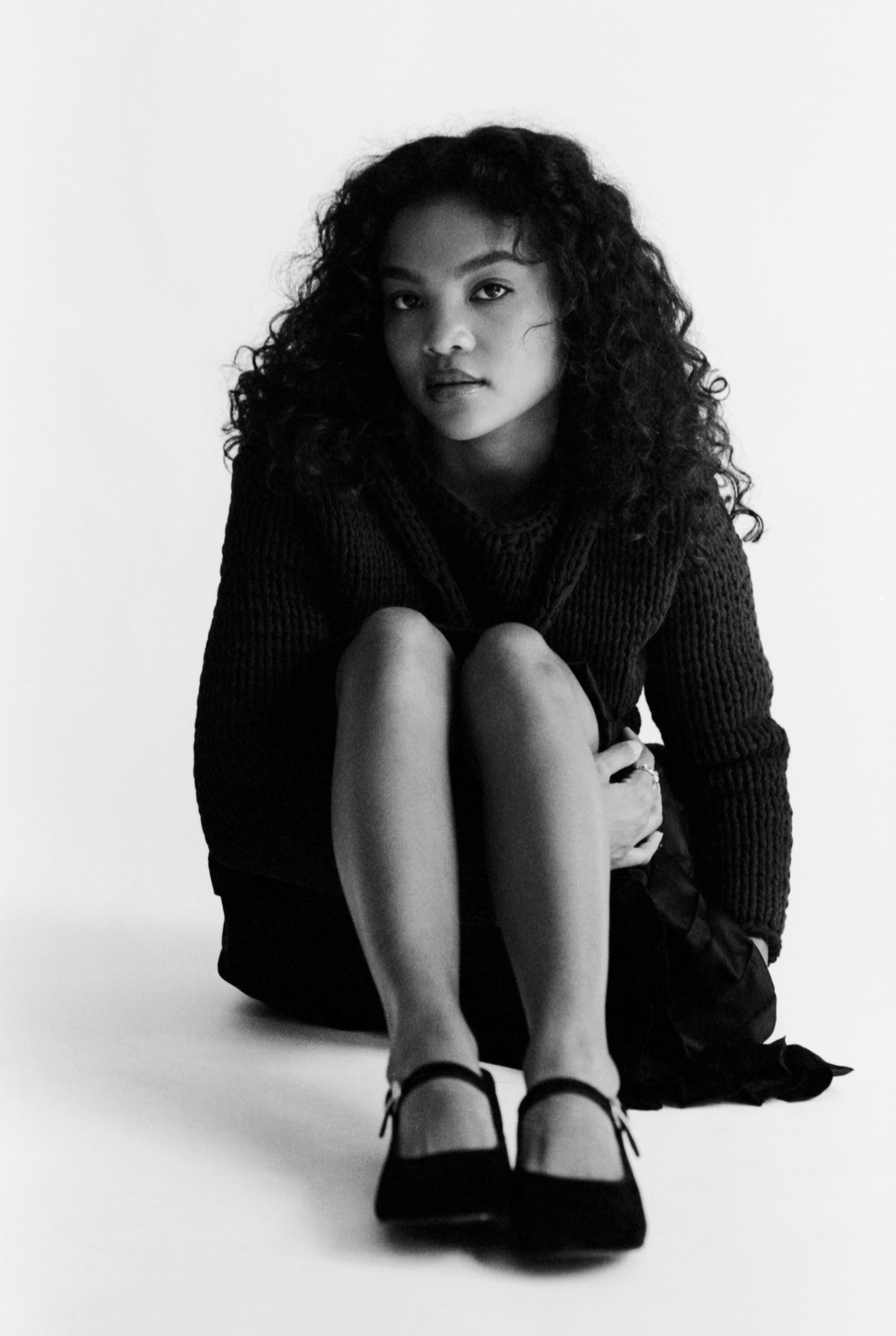
Sweater by Bevza. Skirt by Social Work. Shoes by Reike Nen. Ring by Simuero.
After only a week of downtime in Atlanta following the wrapping of Don’t Make Me Go, Isaac rushed to New York to begin production on Not Okay, a film by Quinn Shephard that follows Danni Sanders (Zoey Deutch), who gains the influencer life she’s always dreamed of after faking a trip to Paris and leaning into a lie that she survived a terrorist attack during her fabricated trip. Isaac plays Rowan, a school shooting survivor Danni meets at a support group whose gun safety activism is displayed through rallies and intensely moving spoken word performances.
Having received the notice for Not Okay while filming Don’t Make Me Go, Isaac says she “almost didn’t audition for it because I was so busy,“ but felt so connected to Rowan that she knew she had to put aside her self-described perfectionism and persevere. “The sides included the spoken word pieces, and I think it was ten pages of sides. I was like, ’There’s no way I’m going to be able to do this because I’m in the middle of shooting!’“ she says. “But I read it and I loved the spoken word. Quinn is so extremely talented as a writer and the spoken word just really resonated with me and I was like, ’I really want to do this.’ So I found a couple of hours that I had free and I did the best that I could, but I didn’t feel like I was fully prepared.“
However, director Shephard says that any sense of feeling unprepared that Isaac felt did not translate to the audition. “I would not have known any of that,“ she says, recalling Isaac’s first audition tape. “I cried watching her audition tape and yelled and jumped out of my couch and was like, ’That’s Rowan!’“
Unlike Danni, Rowan continues to live with real post-traumatic stress from the school shooting she endured, exhibiting true strength as she pushes forward in an earnest fight for a better world. While Rowan sees a sympathetic friend in Danni, all Danni can see is a blueprint for how to capitalize on trauma as she leeches onto Rowan, mining her experiences for her own gain under a disarming guise of trust and care. “There are going to be people like Danni that exist that watch the movie and don’t realize the message of her character, so I think that will be really interesting,“ says Isaac, laughing. “I’ve run into people that are like Danni, I’ve been friends with people like Danni, and that’s what I brought to Rowan and Danni’s friendship.“ Isaac pauses as she considers the similarities between Danni and Rowan and her own personal “hard relationships“ she’s had with some white women. “I know that there’s a lot more to Rowan and Danni with shootings and the trauma and the lies but I think another really interesting thing is just how Danni takes advantage of Rowan,“ she says. “Why do people like her get movies and all the attention, and people like Rowan get nothing and are told just to sit still? I think that that really spoke to me and, hopefully, other people can resonate with that too.“
As Rowan, Isaac’s performance is captivating, delivered with the “passion and pain, but also love, and vulnerability and this fire for life“ that Shephard says she wanted for the character. “Mia just has this intensity and also vulnerability simultaneously that she’s able to bring to her performances that I think is so beyond her years. There’s an old soul quality,“ the director adds. The film eventually culminates in a spoken word performance by Rowan that is so affecting that it forces even the oblivious Danni to finally face reality. “I think there’s something incredibly special about being lucky enough to work with someone as talented as Mia at the beginning of their career because you feel like you’re let in on a secret that maybe even they don’t know yet,“ says Shephard. “Watching her on set was honestly emotional. I just felt so excited and proud for her and all that I could see her accomplishing in the future. A lot of people who worked on the shoot shared that feeling where we would all, kind of behind her back, be like, ’She’s a star! She’ll have Oscars one day!’ Honestly, it was very inspiring. I think that being around that kind of raw young talent is just heartwarming. It’s beautiful.“
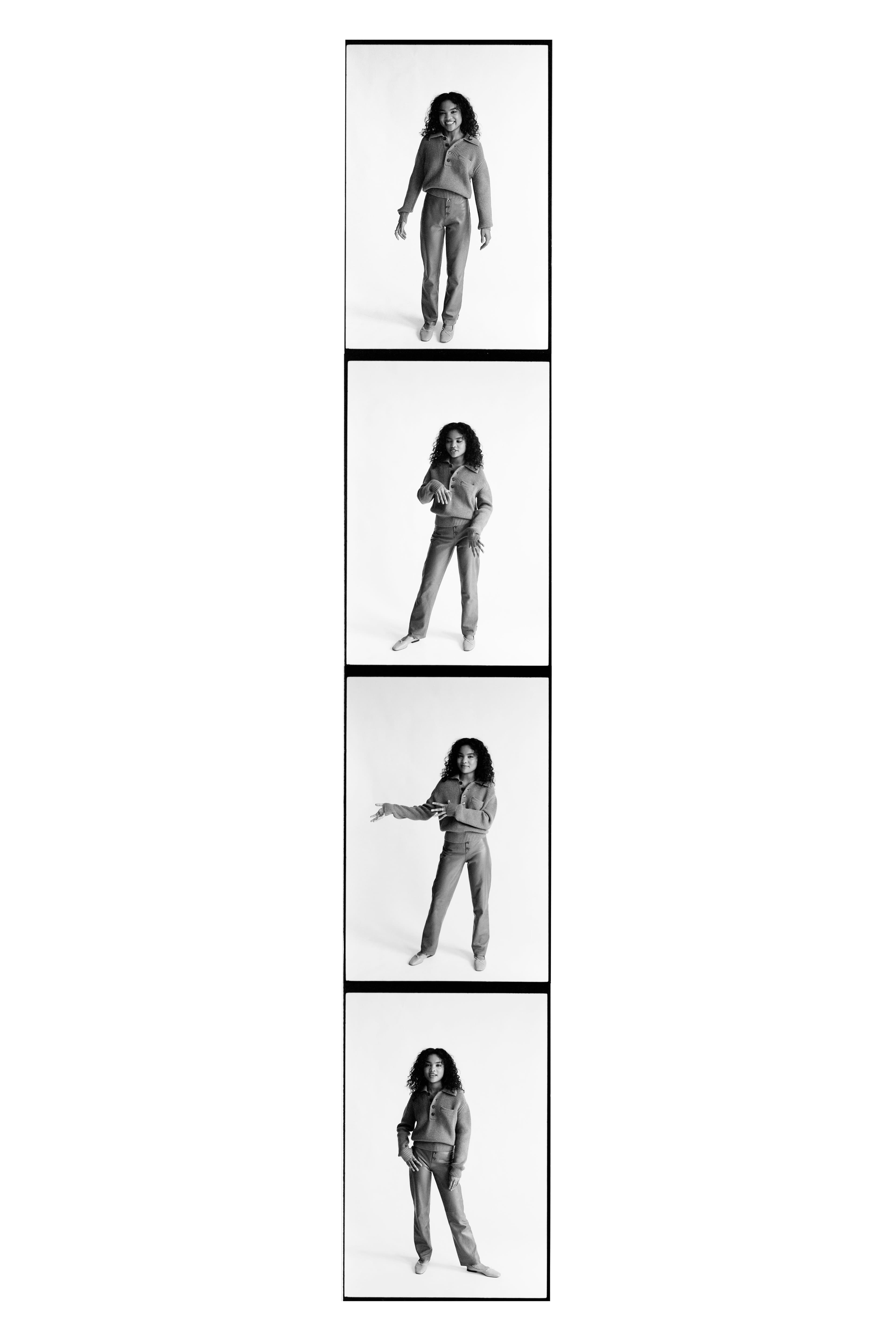
Sweater by Maiden Name. Pants by Aeron. Shoes by Yuni Buffa. Rings by Simuero.
It’s remarkable that Isaac’s first two films have been led by female directors, something which hasn’t gone unnoticed by the actor, who quips, “Fingers crossed that I keep that streak going!“ She’ll continue with the series Black Cake later this year, starring alongside the Tony-winner Adrienne Warren with showrunner Marissa Jo Cerar. Based on the bestselling novel by Charmaine Wilkerson, Isaac plays Covey, a biracial teenager growing up in Sixties Jamaica. “I remember I was with my mom and I found out while I was on set. I didn’t really have much time to freak out, but I was totally freaking out,“ laughs Isaac, recalling the moment she found out she was cast.
Being biracial, Isaac says that she “didn’t even know stories like that existed“ and saw Black Cake as an opportunity to connect with both sides of her Chinese and Jamaican heritage that she shares with Covey. “I read the book with my parents. I loved how close it brought the three of us because it was representative of my mom’s culture and my dad’s culture and we would talk about these different things,“ she recalls. “My dad would talk about how his mom would make black cake for him growing up and how he hated the taste of it, and then my mom would talk about her culture too. Just hearing about both the Jamaican and the Chinese sides and to be able to relate to both sides of it and to talk about it with my parents was really, really special. It just felt so close to who I am.“
The importance of representation is evident when speaking with Isaac about where she sees her future in Hollywood. Beyond a desire to work on a Marvel movie, Isaac says that writing is “one of the biggest loves in my life” and that it is the storytelling aspect of filmmaking that drives her enthusiasm. Hoping to lean further into writing and directing, it is an ambition that feels possible now after working with female directors that she admires. “It was so great to be able to work with Hannah and Quinn because they inspired me so much, and I looked up to them. Writing is something that I’ve always done, but I just wasn’t always super confident in myself, and I never thought of it as something that could really be real,” says Isaac. “But when I met Hannah, and when I met Quinn and saw them doing the things that I was too scared to even dream about, it inspired me. Now I’m hopeful that that can be something that I can look forward to in the future.”
Don’t Make Me Go is now streaming on Amazon Prime Video. Not Okay is now streaming on Hulu.
As a nonprofit arts and culture publication dedicated to educating, inspiring, and uplifting creatives, Cero Magazine depends on your donations to create stories like these. Please support our work here.
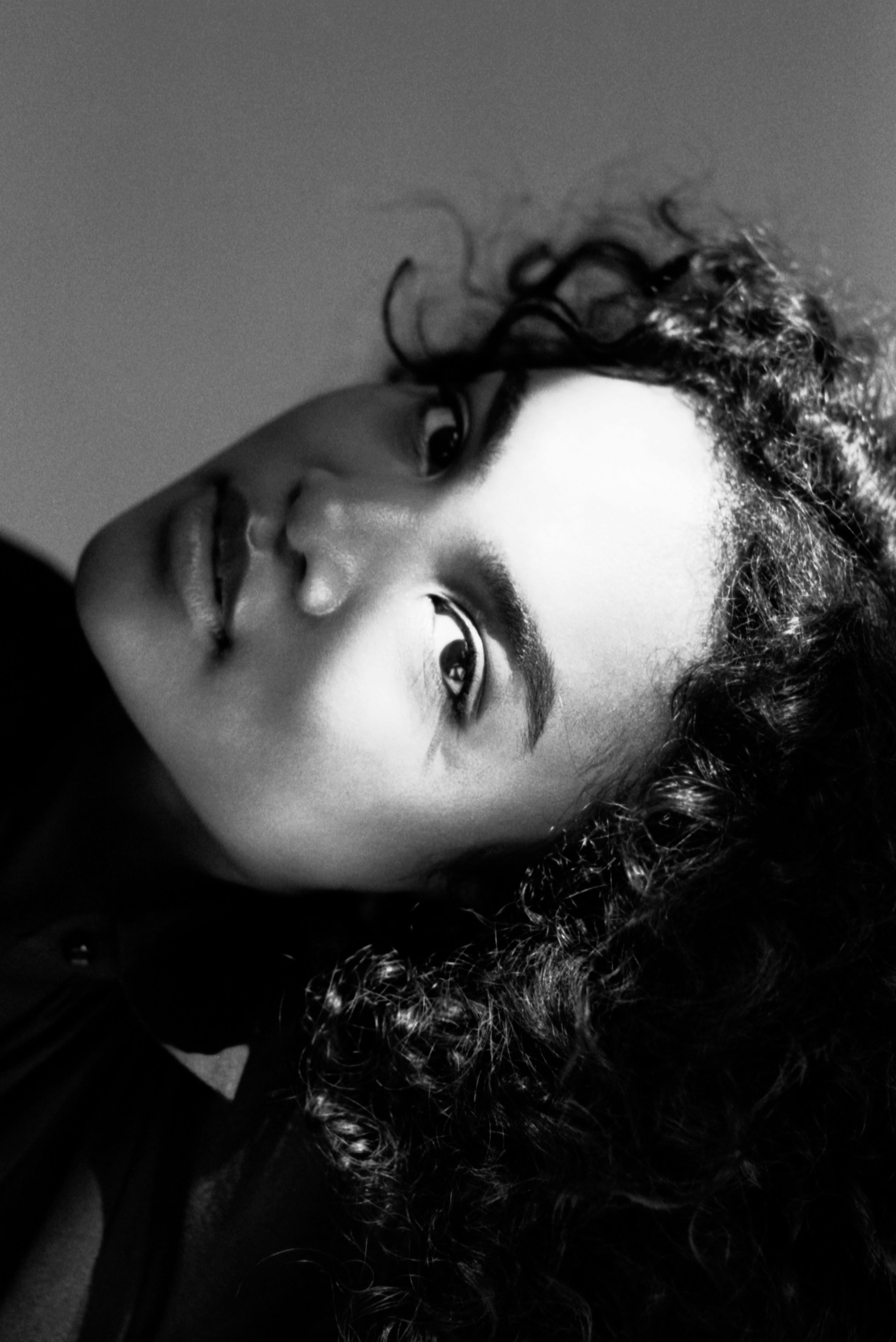
Dress by Ashlyn
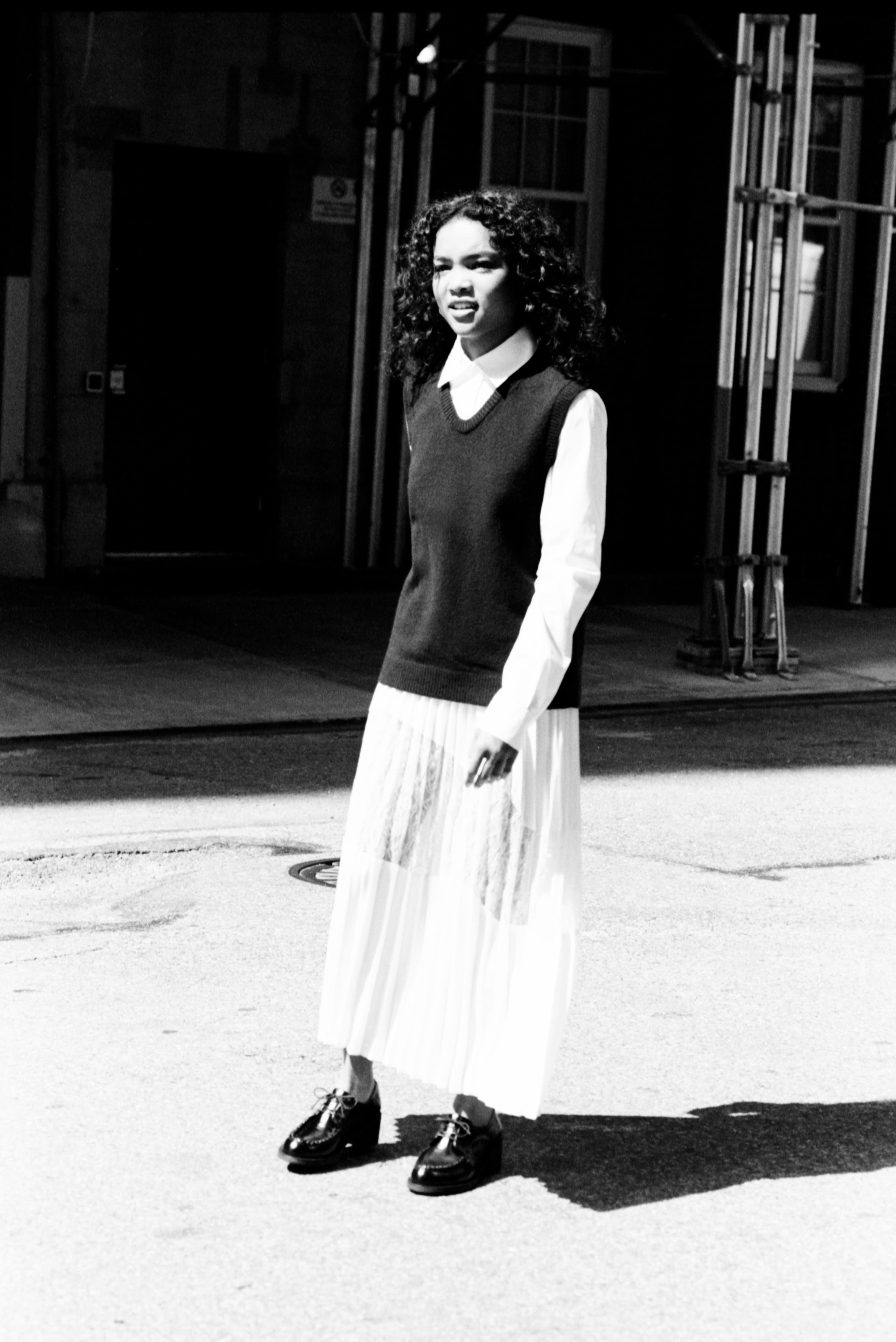
Vest and shirt by Lafayette 148. Skirt by Social Work. Shoes by Reike Nen. Earrings by Elizabeth Hooper Studio.
As a nonprofit arts and culture publication dedicated to educating, inspiring, and uplifting creatives, Cero Magazine depends on your donations to create stories like these. Please support our work here.






